Birding Travel in Covid Year Three
By Ilana DeBare
Are you taking part in birding travel as we slog into our third year of the Covid pandemic?
That was the question I asked Golden Gate Bird Alliance members in our online discussion forum last week. And their answers were all over the map, both geographically and emotionally.
[Editor’s Note: See the bottom of this article for upcoming travel opportunities for birders ready to venture abroad, and also for folks who prefer to stay closer to home.]
Here are snapshots of how Covid has affected some people’s recent travel decisions and experiences:
“Not getting any younger”
Oakland resident Pat Bacchetti took two international birding tours this spring, one to Mexico and the other to Spain and Portugal.
“For me, the decision came down to the fact that I’m not getting any younger, and there are only so many more healthy travel years that I have available to me,” Pat said. “In my case, I’m in my late sixties but healthy, and I’m vaccinated and double-boosted; birding is done outdoors and usually in rural low-population areas; and I can handle the expense of a 5-7 day Covid extension at the end of a trip if I test positive.”
During her visit to Mexico in March, Pat found nearly all the local residents were masked. Combined with spending time outdoors in the countryside, that gave her a high comfort level. In Spain, however, fewer locals were masked and one member of Pat’s tour group contracted mild Covid and had to quarantine while in Madrid. Despite the anxiety this caused, Pat found both trips more than worthwhile.
“The highlights of the trip outweighed the risk of Covid,” she said. “Bustards, vultures, raptors galore, rare ducks, medieval towns, and the Doñana National Park in Spain were all worth it. And Portugal is my new favorite country (after Italy)!”
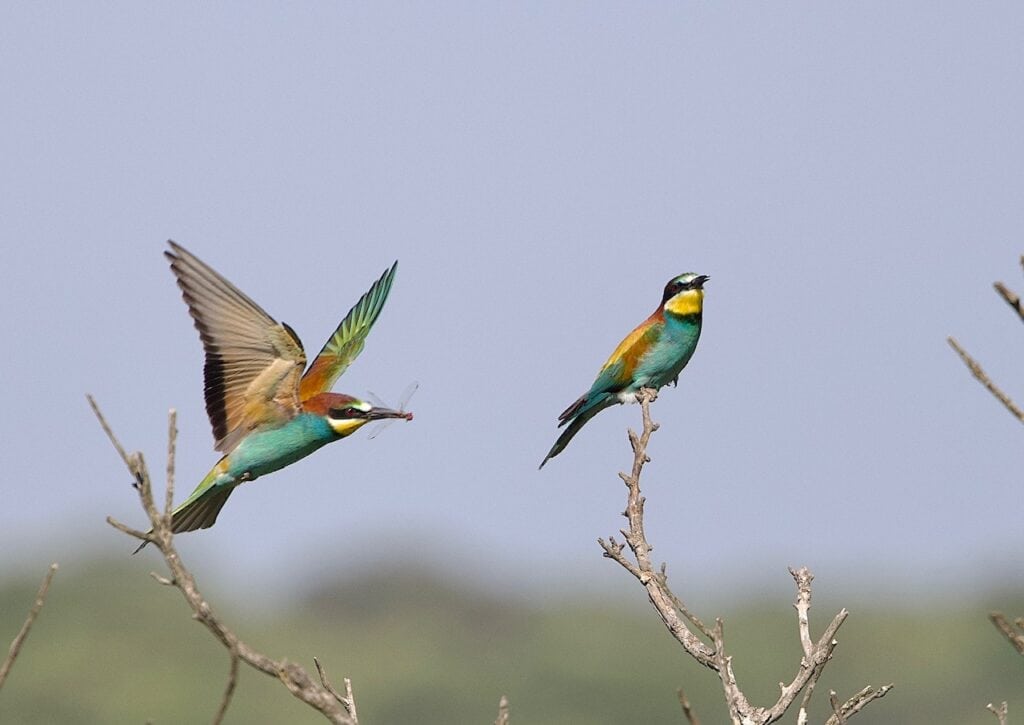
Worth the risks
Dave Quady traveled to Ecuador in January for a group birding tour with four other participants, all vaccinated. At the time, Ecuador had a higher vaccination rate than California.
“My only real concern was whether I’d test negative prior to my return flight,” he said. “I had no specific plan to deal with such a situation (quarantining, etc.), and figured I’d be able to muddle through if I did test positive, whether falsely or accurately. Hasn’t happened yet; hope it never does happen.”
Quady said the trip was definitely worth the risks—especially to see the hummingbirds, which congregated at feeding stations.
“Some moments you can never count on, or even conceive of before they happen,” he said. “The boldness of some hummers at one such feeding station was beyond belief. Here [in the following photo] a Velvet-purple Coronet is perched on my field notebook as I am writing ‘Velvet-purple Hummingbird’ in it. It was a life bird…. Perhaps the bird wanted to confirm that I had gotten its name correct.”
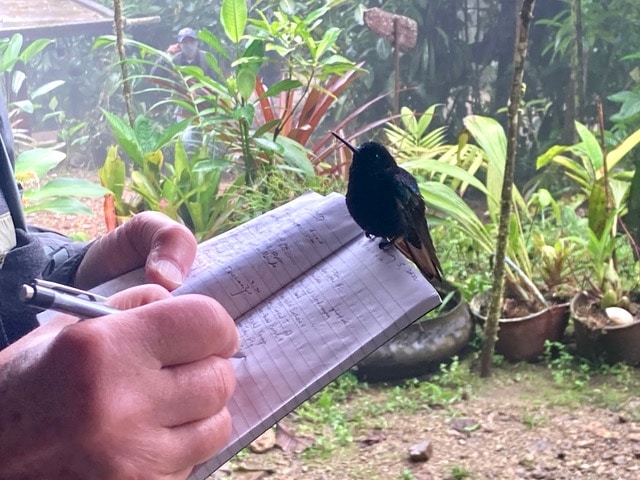
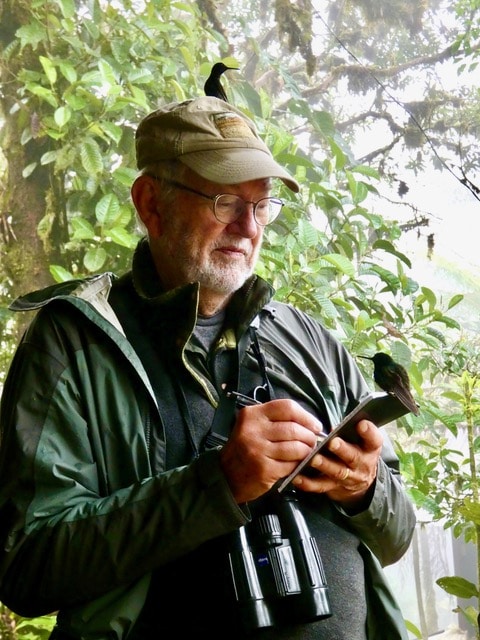
Everyone’s nightmare
Linda and Bob Carloni of Alameda, on the other hand, had the nightmare experience that everyone worries about.
They flew to Spain in April for ten days of urban sightseeing and a birding tour, but contracted Covid before the birding even started. Linda was hospitalized for serious dehydration and a bacterial infection. By the time she recovered, they’d missed the birding trip. Trying to return to the U.S., they both failed the required PCR Covid test because their illness had been so recent, and they had to submit a doctor’s letter documenting their recovery. Thankfully, they are fine now with no lingering after-effects.
“Birds we sighted on the trip were confined to magpies, a Little Egret (a lifer!), and domesticated geese and a peahen,” Linda said. “We’re sticking with birding in the U.S. for a while!”
Being outdoors felt safe
Lori Stoneman just returned from 16 days in South Texas —three days with private guides, and the rest on her own. She chose to stay in Airbnbs since they felt safer than hotels, wore masks on flights and in airports, and practiced social distancing as much as possible.
“Texas is kind of unconcerned about spreading the virus, as you may gather due to their politics, but the people who live in the Rio Grande Valley and who are birders and nature-loving types seem to be more cautious and aware in general,” she said. ” I was comfortable birding because I felt that, being outdoors, I had very little risk of being exposed.”
The highlight for her was birding at the National Butterfly Center, which was unusually empty since it currently limits entry to members. (She bought a membership for $35.)
“My target ‘most-wanted’ bird was the Scissor-tailed Flycatcher,” she said. “I got the show of a lifetime watching two of them court and dance in the air while on the grounds of this magical place. It was super-serene because of the limitations on who could bird there, and both times I was there it was so peaceful and zen-like.”

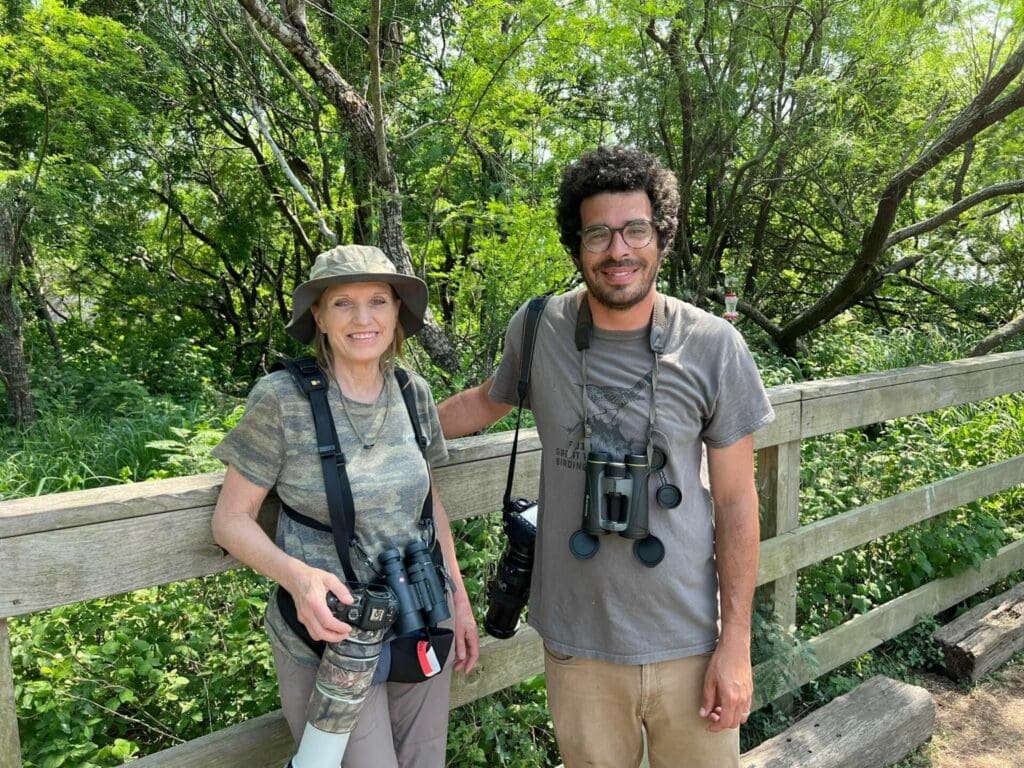
Needing the joy
Ann Buell recently traveled through Chicago to the Indiana Dunes for a birding festival, where she saw Sandhill Cranes and their young, Wilson’s Snipe displaying, American Woodcock performing their evening sky dance, and 14 warbler species. She felt safe in the field and at outdoor festival events, but less so during the van rides to field trips. And the plane trips—with nearly half the passengers unmasked—were stressful.
Despite the van and plane worries, she described the trip as “fabulous.”
“Why was it worth it?” she said. “First of all, I had reached a tipping point in my personal isolation and needed to get out of the house, out of town, and out of my head! Secondly, birding brings me great joy, and I needed that joy really badly.”
Much as she loved it, though, Ann is hesitant about booking more travel.
“I have lots of hesitation about taking another trip, even though there are so many places I want to go. I’d say my main fear is getting Covid while on the trip and then being stuck somewhere while I recover, especially if I am alone.”
Trepidation about traveling
Berkeley resident Nancy Van House isn’t traveling yet—although when she feels ready, birding is the first thing she’ll do.
“I bailed out of a photography trip that would have meant a bunch of people in a van, all day every day. Nope,” she said.
Cathy Bleier is preparing to take her grandson to Costa Rica on a nature-oriented Road Scholar tour in June, but her initial excitement has been overtaken by anxiety.
“I lie awake every night,” she said, “worrying about (a) one of us getting sick before the trip, (b) getting sick during the trip and having to quarantine, (c) not having access to Paxlovid, and (d) getting my grandson stuck in Costa Rica because the U.S. won’t let us back in if we get sick. Yes, there are worse places [to be stuck] but his soccer coaches wouldn’t ever forgive me.”
Stress… about scoters
San Franciscan Scott Bowers, on the other hand, felt more anxiety over missing his target birds than over getting Covid during the six (!!!) international birding trips he’s taken since early 2020. With precautions such as vaccination and masking, Scott figured that Covid didn’t pose much more risk than the risk of malaria, dengue fever, yellow fever etc. normally present in the tropics.
Scott summarized a couple of his trips this way:
June 2021: Was supposed to go to a wedding in U.K., but it was postponed, so used the ticket on Iceland Air to visit Iceland instead. Did not see a mask outside the airport. While we were in Iceland, the Covid rate increased by 400%. Saw lots of birds. Anxiety because I could not find the Common Scoter anywhere even though it was supposed to be common. (Found it on last attempt.)
May 2022: Trip to Fiji to go look for birds. No one cared about Covid. Anxiety caused by missed Chattering Giant Honeyeater and velvet dove.
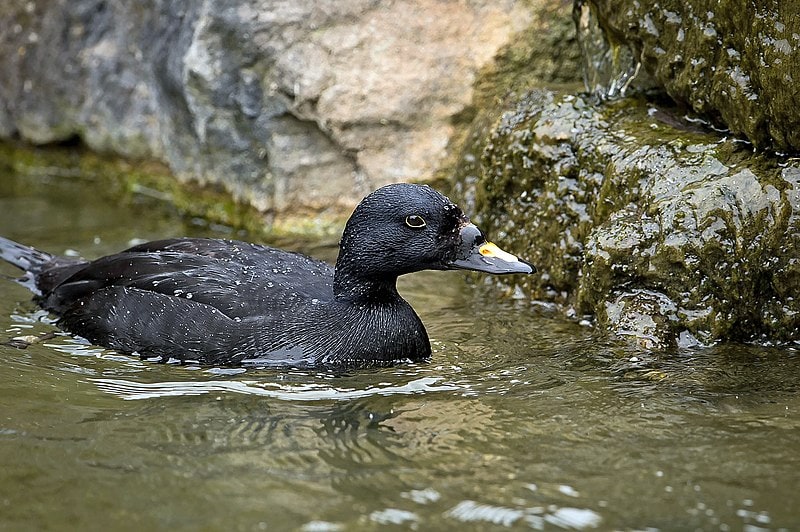
An ambiguous moment
What to make of these varied responses — varied both between individuals, and often within a single individual?
I’m struck by how deep a need birding travel—admittedly a luxury—fulfills for many of us. Not just adding to our life-list, but connecting with other people and with natural beauty, expanding our horizons and learning new things, and feeling part of a larger world.
“You must live your life, so I am very glad I did not put life on hold because people are getting sick,” said Scott Bowers.
At the same time, the joys of birding travel can coexist with fear. We are living in an ambiguous moment—Covid is less deadly now if we’re vaccinated, but it’s also more contagious—and so our feelings about travel can be understandably mixed and ambiguous too.
Pat Bacchetti offers some sage travel advice based on her own experiences, which I’ll include below.
Meanwhile, Golden Gate Bird Alliance has some upcoming opportunities for travel, both near and far:
Our online Birdathon auction prizes include vacation stays in California birding spots that can be reached by car if you prefer to avoid air travel:
- Bodega Bay with Bruce Mast. Two nights at a three-bedroom condo (sleeps seven), with two days of guided birding by GGBA board member Bruce Mast, who co-teaches our Master Birder class.
- Palm Springs. Four nights at the Palm Canyon Resort between January and April 2023, when birding is best.
- South Lake Tahoe. Four nights at the Lake Tahoe Vacation Resort, between April and June 2023, when birds are nesting in the forests and fields around the lake.
- San Diego. Four nights at the Pacific Breeze Resort on the boardwalk in Mission Bay between January and April 2023. Explore the nearby Kendall Frost Marsh, with 16 acres of salt marsh and an observation platform for viewing endangered Light-Footed Clapper Rail and the Belding’s Savannah Sparrow.
Bid now: The auction closes this Friday, May 27, at 7 p.m. Click here for details about these and other prizes, including an Alcatraz waterfowl walk, a tasting of bird-friendly chocolates combined with an Alameda bird walk, a Sandhill Crane evening viewing and tailgate party, and more. Your auction bids will help Golden Gate Bird Alliance continue our important conservation and educational work!
Further afield: We still have a few openings on these upcoming international trips with responsible and reliable professional birding tour companies:
- Uganda: Gorillas, Chimpanzees and Lots of Birds—July 2022.
- Namibia to Botswana Safari—September 2022.
- Iguazu Falls and Brazil—September 2022
- Madagascar Magic—October 2022
- Plus trips in 2023 to Colombia, India, Utah, Southern Africa, and Southeast Arizona. Click here for details on all our trips.
—————————
Pat Bacchetti’s Tips for Birding Travel in mid-2022
Assess your health risks carefully, and go into the experience with the assumption that Covid is a real risk.
Think about how much you really want to see that rare bird. Is it worth the risk of getting Covid?
Travel with a reputable company that takes reasonable precautions. Talk to them in advance about how they would handle a Covid episode. They should be factual and straightforward about it: If not, I wouldn’t travel with them.
Research the entry requirements for each country that you will be traveling to or through. They each have their own requirements, even within the E.U. I had to fill out paperwork for the Netherlands (transit through Amsterdam), Portugal, and Spain. It took time.
Get travel insurance. Call the company and ask for the policy that will cover Covid emergencies both before, during, and at the end of a trip. Better to avoid surprises if an emergency arises. Note: Extensive Covid-coverage policies are more expensive.
Pack several Covid antigen tests. If you’re in Western Europe, they’re readily available in pharmacies and usually cheaper than in the U.S. Consider taking a pulse oximeter (available on Amazon) to keep track of your oxygen levels if you contract Covid.
Avoid crowded indoor areas, especially if the locals aren’t masking regularly.
Mask mask mask!
Eat outdoors every occasion that you can.
Because U.S. citizens still must have a negative test 24 hours before boarding a flight home, find out about the availability of testing at your departure airport or hotel. (I had to make several calls and emails to our Madrid airport hotel and a Covid testing company nearby.) Check with your airline: Some airlines have requirements that differ from country requirements. Birding tour companies will often arrange pre-flight tests, so ask if they can help you with this.
Assess your ability to absorb 5-7 days of extra hotel rooms, food, and changed flight fees if you test positive at the end of a trip. Insurance may help pay for that, but your policy has to specify that.
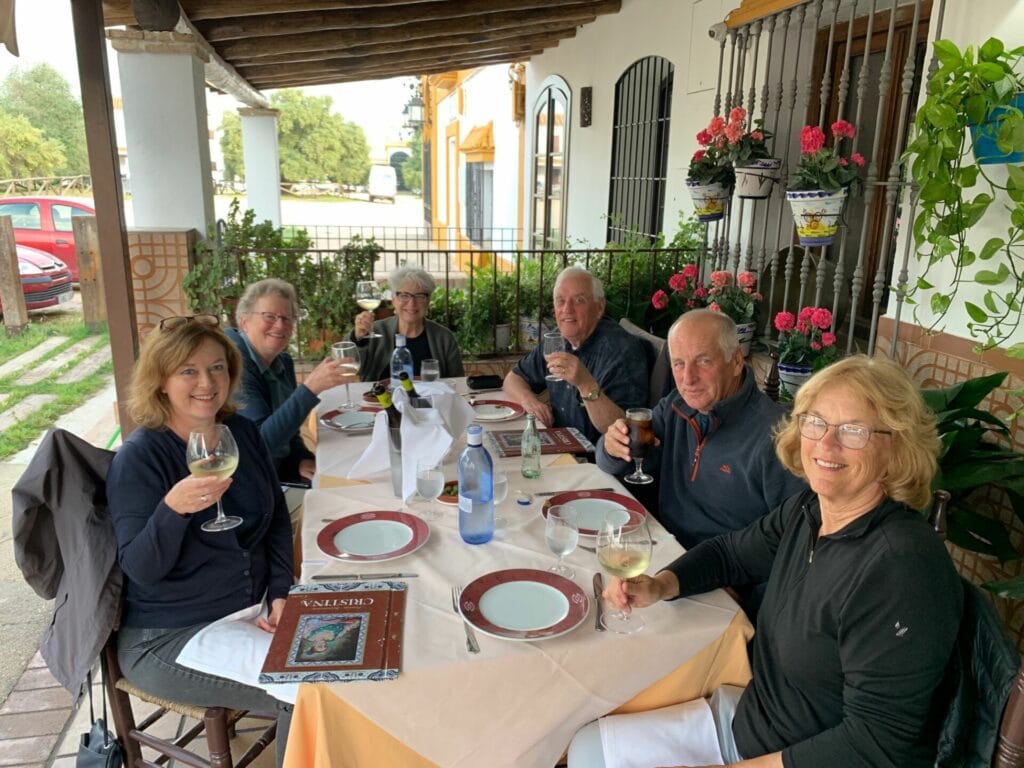
————————–
Ilana DeBare is a board member of Golden Gate Bird Alliance. She has a trip to Panama calendared for December that was initially booked for 2020, rescheduled to 2021 because of Covid, and rescheduled again to 2022. (Third time a charm?) Meanwhile, Ilana’s novel Shaken Loose will be published by Hypatia Press in Summer 2023.
